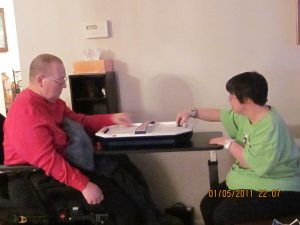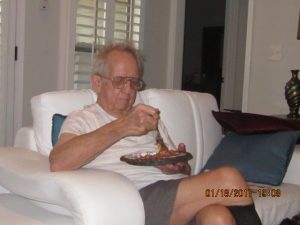
Few think of the caretaker once his or her charge dies. Few realize that a caretaker faces a dilemma with which others may not have to deal. In this instance I refer to one who cares for a spouse or other family member. As a caretaker twice over, I found each case to be dramatically different when, in a blink of an eye, my life’s focus changed. With the changes, many similar problems also surfaced.

First Caretaker Learning Experience
I stopped working outside the home to become my husband’s full-time nurse, aide, therapist and housekeeper. When he had five heart bypasses healing, although never complete, pushed along at a rapid pace. That is, it was rapid after two months in the hospital trying to stop infections that plagued him. Because depression affected his recovery, he arrived home with his chest cavity open and my days as caretaker began.
After a week of unpacking gauze from the wound, cleaning the opening and repacking it, we received a wound vac. That machine proved to be a godsend in that it suctioned and cleaned the wound without having to do all the manual work. I emptied it twice a day and watched as it miraculously healed and closed the wound. So ended my caretaker role for four years. Compared to the massive stroke he then suffered, the heart bypasses proved to be a cakewalk.
Our lives turned upside down as we moved to Dover, Pennsylvania, at the suggestion of the doctor. We thought he meant we might get better healthcare there. Only after short-selling our home, taking a mere two days to find a rental residence, and arranging for Bru’s ambulance delivery to HealthSouth Rehabilitation, did he tell us the real reason. Our son lived there. The fact that Florida, the state from which we moved, provided a much better stroke program, he never took into account.
For three years, we fought a losing battle to increase his abilities to walk, speak, do anything for himself. When kidney problems arose, he refused dialysis and not too long afterward all bodily functions shut down.

The Second Time Around
Before having time to grasp the finality of my husband’s death, my brother’s kidneys failed. My daughter and I moved to Florida four months after Bru’s funeral. One year and ten months later we sold our new home and bought another in the small town of Eclectic, Alabama. As Jim’s health diminished, it became necessary for him to sell his home and move in with us.
Eventually he started dialysis three times a week and with that miracle his strength returned. He told everyone how the procedure gave him a new life. He felt more than capable of following his love of gardening, going to the casino occasionally, and seemed to regain much of his previous activities. I took him to dialysis, waited the four hours plus that the procedure took each time. I also noted those who spent years on the machines that cleaned their blood three times every week.
Eventually their energy collapsed. Many turned to wheelchairs. Others relied on canes, walkers or another person helping them get around. Still others suffered nausea and far too many visited hospitals, often spending more time there than at home.
Although I shared Jim’s happiness in his new found energy, I dreaded the day the changes began. That day came far too soon. He rejoiced for a brief two and a half years before he depended more on his computer for entertainment. His energy levels diminished alarmingly. Visits to the flower beds to set out new plants, weed between them and spray homemade bug repellents dropped off sharply by the end of his fourth year. I offered to get him a rolling flat wagon to help him get around more. However, as his body lost its abilities, his mind strayed to less taxing enterprises.
His life turned into hospital visits filled with hallucinations as his oxygen levels or kidney poisons played havoc with his mind. At one point, his breathing became so labored that he ‘died’ as the EMTs pushed him into the emergency room. He never fully recovered from that terrible night. After fighting for almost five years, he lost the last round with a ‘widow maker’ heart attack during a triple bypass operation.
The Caretaker Dilemma
When Bruce died, the feeling of loss made me want to stop, give up and rethink living. This is not uncommon with the loss of a spouse. The reason for going on with my life came in the beauty of a daughter. Born with Down’s syndrome and a godsend from the beginning, when I crawled into bed ready to give up, she urged me up and onward with the task of living.
She unfailingly provided a much-needed helping hand with her dad. When her uncle became our charge, once again Jaimie provided that valuable right arm to keep him with us. She provided physical assistance and, as with Bruce, her bright personality brought mental joy. Together she and her uncle cheered for Alabama, the football team. Both relished golf and just about any other sport, cheering while wearing their team colors. She listened intently every night for any indication he needed help returning to bed after a bathroom trip.
As with Bruce, when Jim died, she proved to be the strong one, assuring me he now lived in heaven. Yet, with so many years of caretaking, this time depression hit and rising from it took time. While thinking over the last years spent with two very special men in my life, it suddenly occurred to me why the death of my brother hit harder than that of my husband. Caretaking, which became such a huge part of my life, came to an abrupt end. Without that very important task to perform, the days felt empty.
We moved to Florida almost immediately after Bru died. We bought a home that required a number of repairs and some remodeling. For most of our short stay, we spent the days tending to those problems and not worrying over how to get through each moment.
Family caretakers, unlike professionals who move to new positions, discover their primary function ends and far too often, so do prospects for working outside the home. The world refuses to wait as a person’s job qualifications grow stale or as the years roll on. Regardless of laws, rules and regulations made by well-meaning legislators, companies tend to favor the young and middle-aged over the older when hiring.
The challenge becomes making each day count, finding a way to remain relevant in one’s own eyes. For me, that meant joining community groups, trying to form a club of my own for widows and widowers, getting involved with the town in any way possible. Finally I began a secret project where each month a caretaker received an anonymous gift thanking him/her for their dedication to another.
Eventually every caretaker learns a hard-earned lesson – Care For Yourself. To maintain one’s own health, take time to relax, laugh and, as the old saying goes, take time to smell the roses. It is amazing how much time passes when a caretaker refuses to look inward at herself instead of only outward at others. The best thing any caretaker can do is find a hobby, some way to make a few dollars or a lot of them, in the time between caring for someone else. When the task of healing the wounds of others ends, she will be ready to face tomorrow uplifted instead of downtrodden.
https://waterfallmagazine.com
Hi there! This is my first comment here so I just wanted to
give a quick shout out and tell you I truly enjoy reading your blog posts.
Can you recommend any other blogs/websites/forums
that cover the same topics? Thank you so much!
Sorry, I just saw your comment. Right off-hand, I can’t think of any but if you will Google something like “senior blogs” or blogs about seniors, you may find several. I know there are some others.
Carol North